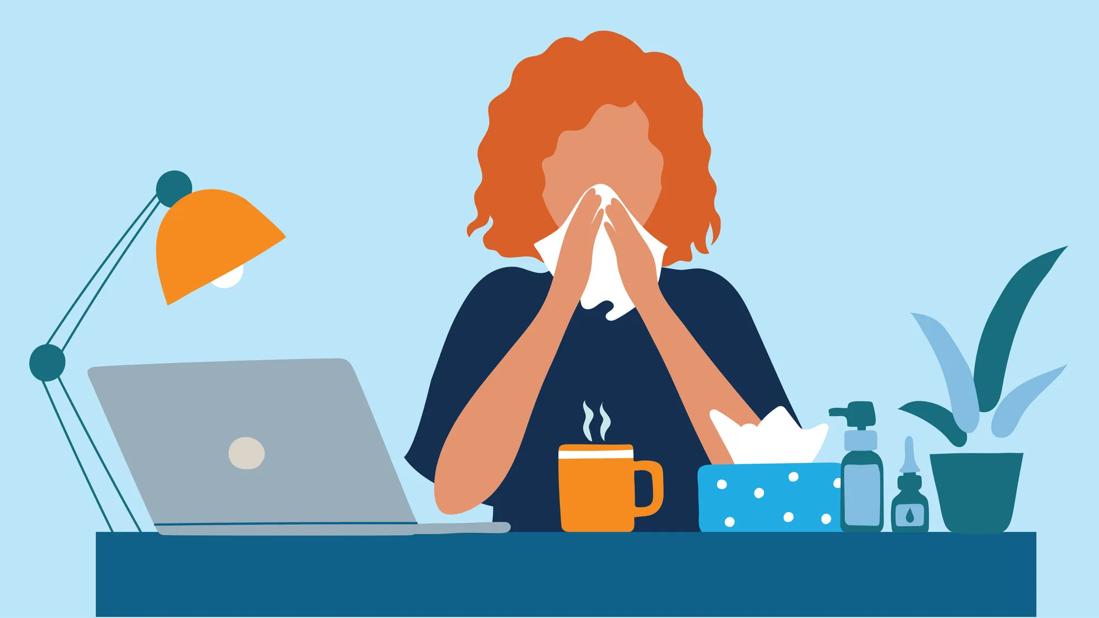Sinus infections tend to last longer and include symptoms like facial pressure and discolored mucus

Runny nose, headache, nagging cough… Are you dealing with a run-of-the-mill cold, or are these actually signs of a sinus infection? While it’s true that many of the symptoms overlap, there are a few ways to figure out the difference.
Advertisement
Cleveland Clinic is a non-profit academic medical center. Advertising on our site helps support our mission. We do not endorse non-Cleveland Clinic products or services. Policy
Rhinologist Troy Woodard, MD, explains how to know which one you have, plus tips for treating your symptoms.
When it comes to the battle between a sinus infection and a cold, knowing which one you have can be tricky. To tell the difference between the two, Dr. Woodard recommends asking yourself these four questions:
Advertisement
“A lot of the symptoms overlap,” Dr. Woodard reiterates. “But with sinus infections, those distinguishing factors are usually facial pressure and discolored drainage that lets you know that it’s turned bacterial.”
A cold is a virus at work in your upper respiratory system (encompasses your nose, mouth, throat and lungs). But sometimes, the mucus from a cold can block your sinuses and turn into a sinus infection.
A sinus infection occurs when the lining of your sinuses becomes inflamed. This prevents the sinuses from draining, sort of like a backed-up sewer.
“When swelling and nasal congestion block the sinus drainage, all that mucus builds up and becomes a breeding ground for bacteria to thrive,” Dr. Woodard explains.
But not all sinus infections are viral. They can also be caused by bacteria, fungus and even allergies — anything that causes enough mucus to clog up your sinuses.
Some people are more likely to get sinus infections than others. You may be prone to chronic sinusitis if you have:
Cold and sinus infections often overlap. Both can bring:
What about fever? Though both conditions can cause your temperature to spike, this symptom is typically a sign of a cold.
“Viruses are more likely to be associated with fevers,” Dr. Woodard confirms. “It has to be a really severe sinus infection to cause a fever.”
We’ve already talked about the symptoms of a sinus infection. But for the sake of ease (who doesn’t love a list?), they’re worth repeating here. In addition to the symptoms named above, sinus infections often bring:
Viruses can’t be cured with antibiotics, so treating colds is mostly about improving your symptoms.
“It’s important to remember that with colds and other viruses, taking an antibiotic won’t help you feel better any faster,” says Dr. Woodard. “In fact, taking an antibiotic when you don’t need one can do more harm than good.”
Overusing antibiotics can lead to antibiotic resistance, which can make future infections harder to treat. Instead, Dr. Woodard advises focusing on doing things that will help you feel better and allow your body to heal.
Advertisement
“Get plenty of rest, stay hydrated and rinse out your sinuses with saline irrigation, which can help thin mucus and flush it from your nasal cavity,” he adds.
The same self-care habits can also help you through a sinus infection — but you may need to see a healthcare provider, too. Make an appointment if your symptoms don’t go away within 10 days, or if you have persistent symptoms like:
“Sinus infections sometimes clear on their own, but antibiotics may shorten their duration,” Dr. Woodard notes. “As with colds, proper hydration and nasal irrigation can also ease sinus infection symptoms.”
Advertisement
Learn more about our editorial process.
Advertisement

They’re viral cousins, but enteroviruses are more likely to cause serious illness

You can’t cure a cold, but these simple home remedies can help you feel better faster

Don’t expect miracles out of ‘immune-boosting’ supplements when you’re sick

Enteroviruses are often to blame for summer colds, leading to a runny nose, sore throat and digestive symptoms

Stress and unhealthy habits can lead to more colds, but taking some precautions may help you stay well

On their own, honey can help soothe a sore throat and garlic has immunity-boosting properties, but you don’t need to go the fermented route

Symptoms can overlap and be hard to distinguish, but there are some telltale differences

The flu, RSV, COVID-19, pneumonia and more typically circulate during cold weather months

The tropical fruit is a good source of antioxidants and vitamin C

Most people fall asleep within 10 to 20 minutes, but if your experience is different, adjusting your sleep schedule may help

Exploring your hidden side can lead to better understanding of what makes you tick